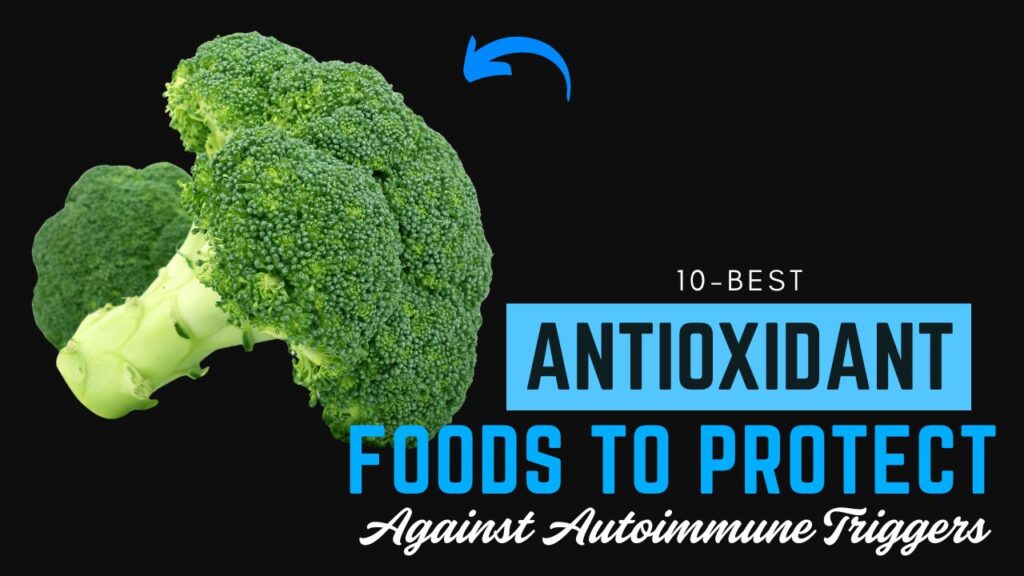Some links in this blog are affiliate links. If you make a purchase through these links, I may receive a small commission. This helps support the site at no extra cost to you.
Did you know that chronic inflammation is one of the hidden drivers behind autoimmune flare-ups? From fatigue and joint stiffness to digestive troubles, autoimmune triggers can feel overwhelming—but nature has provided a powerful weapon: antioxidant-rich foods.
Antioxidants neutralize free radicals, calm inflammation, and protect the immune system from going into overdrive. Research has shown that including antioxidant foods in your daily diet may help reduce flare-ups, support cellular repair, and keep your immune defenses in balance.
In this post, we’ll explore 10 antioxidant-packed foods that science says can protect against autoimmune triggers. For each food, you’ll learn:
- Why it’s powerful against inflammation and immune imbalance.
- The best ways to eat or use it.
- Who should eat it (and who should avoid).
- Storage and buying tips.
- Quick do’s & don’ts.
- Possible side effects.
Let’s dive into the healing kitchen!

Table of Contents

10 Best Antioxidant Foods To Eat
1. Blueberries
Blueberries are often called “nature’s candy,” but unlike sweets, they’re packed with anthocyanins, powerful antioxidants that fight inflammation and oxidative stress. Studies show they may improve brain health, stabilize blood sugar, and protect against autoimmune triggers.
Best Ways to Eat or Use It
- Fresh as a snack.
- Blend into smoothies.
- Add to oatmeal or yogurt.
- Lightly frozen for desserts.
Tip: Combine with vitamin C–rich fruits (like oranges) to enhance antioxidant absorption.
Who Should Eat / Avoid
- Good for: those with autoimmune arthritis, fatigue, or digestive issues.
- Avoid if: allergic to berries or prone to kidney stones (due to oxalates).
Storage & Buying Tips
- Choose plump, deep-blue berries.
- Store in the fridge for up to a week.
- Freeze immediately to extend shelf life.
Do’s & Don’ts
| ✅ Do | ❌ Don’t |
|---|---|
| Wash before eating. | Leave unrefrigerated for long. |
| Freeze for year-round use. | Add excessive sugar. |
Possible Side Effects
Overeating may cause stomach upset or diarrhea in sensitive people.
2. Spinach
This leafy green is a powerhouse of vitamin C, beta-carotene, and lutein, all of which are potent antioxidants that help regulate the immune system.
Best Ways to Eat or Use It
- Fresh in salads.
- Lightly steamed to preserve nutrients.
- Blended in green smoothies.
- Added to soups and curries.
Tip: Pair with healthy fats like olive oil for better absorption of fat-soluble antioxidants.
Who Should Eat / Avoid
- Good for: athletes, women with iron deficiency, and people with chronic fatigue.
- Avoid if: prone to kidney stones (high in oxalates).
Storage & Buying Tips
- Select bright green leaves with no yellowing.
- Store in a paper towel–lined bag in the fridge.
- Use within 3–5 days.
Do’s & Don’ts
| ✅ Do | ❌ Don’t |
|---|---|
| Steam lightly. | Overcook (destroys nutrients). |
| Combine with citrus for iron absorption. | Leave in sealed bag (causes spoilage). |
Possible Side Effects
Too much spinach can interfere with calcium absorption.
3. Green Tea
Rich in EGCG (epigallocatechin gallate), green tea is one of the most studied antioxidant beverages. It’s been linked to reduced inflammation and improved immune regulation.
Best Ways to Eat or Use It
- Brew fresh green tea.
- Add matcha powder to smoothies.
- Use in homemade iced tea.
Tip: Avoid boiling water directly on green tea leaves—let it cool slightly to protect antioxidants.
Who Should Eat / Avoid
- Good for: weight-loss seekers, those with brain fog, or inflammatory conditions.
- Avoid if: sensitive to caffeine, pregnant, or on blood-thinning medication.
Storage & Buying Tips
- Buy loose-leaf or matcha for maximum freshness.
- Store in an airtight container away from light.
Do’s & Don’ts
| ✅ Do | ❌ Don’t |
|---|---|
| Steep 2–3 minutes. | Reuse tea leaves multiple times. |
| Choose organic matcha. | Drink on an empty stomach (may cause nausea). |
Possible Side Effects
Excess may lead to insomnia, anxiety, or stomach irritation.
4. Turmeric
Turmeric’s golden compound, curcumin, is a potent antioxidant and anti-inflammatory. It’s often used in traditional remedies to ease arthritis, digestive problems, and immune overactivation.
Best Ways to Eat or Use It
- Add to curries, soups, or rice.
- Mix turmeric latte (golden milk).
- Combine with black pepper for better absorption.
Who Should Eat / Avoid
- Good for: people with autoimmune arthritis, skin conditions, or joint pain.
- Avoid if: prone to gallstones or on blood thinners.
Storage & Buying Tips
- Buy fresh turmeric root or high-quality powder.
- Store root in the fridge; powder in airtight jars.
Do’s & Don’ts
| ✅ Do | ❌ Don’t |
|---|---|
| Add black pepper for absorption. | Consume raw in excess. |
| Cook gently to release flavor. | Store powder in humid areas. |
Possible Side Effects
Large doses may cause stomach upset or interact with medications.
5. Garlic
Garlic contains allicin, an antioxidant with antimicrobial and anti-inflammatory effects. It supports immune balance and has been linked to reduced autoimmune flare-ups.
Best Ways to Eat or Use It
- Crush raw garlic and let it sit before cooking (enhances allicin).
- Add to soups, stir-fries, or roasted vegetables.
- Blend into sauces or dips.
Who Should Eat / Avoid
- Good for: immune-compromised individuals, those with heart conditions.
- Avoid if: prone to acid reflux, on blood-thinning medications, or allergic.
Storage & Buying Tips
- Buy firm, dry bulbs.
- Store in a cool, dry place (not the fridge).
Do’s & Don’ts
| ✅ Do | ❌ Don’t |
|---|---|
| Crush before use. | Store in the fridge (sprouts faster). |
| Use raw in dips for max benefits. | Eat in excess (causes bloating). |
Possible Side Effects
Too much garlic may cause bad breath, bloating, or digestive upset.
6. Walnuts
Walnuts are rich in vitamin E, polyphenols, and omega-3 fatty acids, making them a perfect antioxidant snack for autoimmune support.
Best Ways to Eat or Use It
- Snack on a handful daily.
- Add to salads, oatmeal, or baked goods.
- Blend into nut butter.
Who Should Eat / Avoid
- Good for: brain health, heart health, and people with autoimmune fatigue.
- Avoid if: nut allergies are present.
Storage & Buying Tips
- Buy unsalted, raw walnuts.
- Store in airtight containers in the fridge.
Do’s & Don’ts
| ✅ Do | ❌ Don’t |
|---|---|
| Store in the fridge for freshness. | Eat rancid nuts (toxic compounds). |
| Eat a handful daily. | Overeat (calorie-dense). |
Possible Side Effects
Overconsumption may lead to weight gain or digestive discomfort.
7. Broccoli
Broccoli is rich in sulforaphane, a compound that activates antioxidant pathways and lowers inflammation.
Best Ways to Eat or Use It
- Lightly steamed to retain antioxidants.
- Added to stir-fries, soups, or roasted.
- Blended into green smoothies.
Tip: Pair with mustard seeds to boost sulforaphane activity.
Who Should Eat / Avoid
- Good for: those with autoimmune gut issues or detox needs.
- Avoid if: prone to thyroid problems (excess may interfere with iodine).
Storage & Buying Tips
- Choose firm, dark-green florets.
- Store in the fridge for up to 5 days.
Do’s & Don’ts
| ✅ Do | ❌ Don’t |
|---|---|
| Steam lightly. | Overcook (loses nutrients). |
| Combine with seeds or spices. | Store wet (causes spoilage). |
Possible Side Effects
Too much may cause gas or bloating.
8. Dark Chocolate (70% or higher)
Dark chocolate is loaded with flavanols, antioxidants that lower blood pressure and calm inflammation.
Best Ways to Eat or Use It
- A small piece after meals.
- Melt into hot drinks.
- Add to oats or desserts.
Who Should Eat / Avoid
- Good for: mood improvement, fatigue, and stress relief.
- Avoid if: caffeine sensitive, or on strict calorie control.
Storage & Buying Tips
- Buy dark chocolate (70% cocoa or more).
- Store in a cool, dry place.
Do’s & Don’ts
| ✅ Do | ❌ Don’t |
|---|---|
| Choose unsweetened or low-sugar. | Eat in large quantities. |
| Pair with nuts or fruits. | Store in hot/humid conditions. |
Possible Side Effects
Overeating can lead to migraines, weight gain, or insomnia.
9. Tomatoes
Tomatoes are rich in lycopene, an antioxidant that calms inflammation and supports heart and immune health.
Best Ways to Eat or Use It
- Cooked with olive oil for better lycopene absorption.
- Fresh in salads and salsas.
- Blended into soups and sauces.
Who Should Eat / Avoid
- Good for: those with skin or joint-related autoimmune issues.
- Avoid if: sensitive to nightshades (may worsen symptoms in some).
Storage & Buying Tips
- Pick firm, ripe tomatoes.
- Store at room temperature until ripe, then refrigerate.
Do’s & Don’ts
| ✅ Do | ❌ Don’t |
|---|---|
| Cook with olive oil. | Store unripe in the fridge. |
| Use in sauces for more lycopene. | Eat if nightshade-sensitive. |
Possible Side Effects
Can cause acid reflux or joint flare-ups in nightshade-sensitive people.
10. Pomegranates
Pomegranates are rich in polyphenols and vitamin C, which calm inflammation and protect against oxidative stress.
Best Ways to Eat or Use It
- Eat fresh seeds.
- Blend into juices or smoothies.
- Sprinkle over salads or yogurt.
Who Should Eat / Avoid
- Good for: people with autoimmune fatigue, heart conditions, or skin issues.
- Avoid if: on blood pressure or blood-thinning medication (consult doctor).
Storage & Buying Tips
- Choose heavy, bright red fruits.
- Store whole pomegranates at room temperature for a week; refrigerate for longer.
Do’s & Don’ts
| ✅ Do | ❌ Don’t |
|---|---|
| Eat seeds fresh. | Leave opened fruit unrefrigerated. |
| Use juice without added sugar. | Overconsume juice (high in sugar). |
Possible Side Effects
Too much may cause diarrhea or interact with medications.
Conclusion
Autoimmune conditions may feel unpredictable, but what you eat can significantly influence how your body responds to inflammation.
These **10 antioxidant-rich foods—blueberries, spinach, green tea, turmeric, garlic, walnuts, broccoli, dark chocolate, tomatoes, and pomegranates—**offer protective compounds that calm inflammation, protect cells, and regulate immune activity.
By choosing and preparing them wisely, you’re giving your body a strong defense against autoimmune triggers. Start small: add blueberries to your breakfast, sip green tea in the afternoon, or sprinkle walnuts over your salad.
Food is more than fuel—it’s medicine. Which of these antioxidant foods will you add to your next meal? Share your favorite recipe in the comments!
Frequently Asked Questions (FAQs)
What are antioxidants, and why are they important for autoimmune conditions?
Antioxidants are compounds that neutralize free radicals and reduce oxidative stress in the body. For people with autoimmune conditions, they help calm inflammation, protect tissues from damage, and may reduce flare-ups.
Can eating antioxidant foods cure autoimmune diseases?
No, antioxidant foods cannot cure autoimmune diseases. However, they can help manage symptoms, reduce inflammation, and support overall immune balance when included in a healthy lifestyle.
How often should I eat antioxidant-rich foods?
For maximum benefit, aim to include at least one to two servings of antioxidant-rich foods in every meal. Variety is key—different foods contain different antioxidants.
Are supplements as effective as antioxidant-rich foods?
Whole foods are more effective because they contain a combination of nutrients, fiber, and phytonutrients that work together. Supplements may help in deficiencies but should not replace a balanced diet.
Can antioxidant foods trigger autoimmune flare-ups in some people?
Yes, certain foods like tomatoes (nightshades) or nuts can trigger flare-ups in sensitive individuals. It’s important to listen to your body and work with a healthcare provider to identify triggers.
What’s the best time of day to eat antioxidant foods?
There’s no strict timing—morning, afternoon, or evening all work. However, spreading them throughout the day ensures steady protection against oxidative stress.
Can children with autoimmune conditions eat these foods?
Most antioxidant foods like fruits, vegetables, and nuts are safe for children. But always consider age, allergies, and portion size, and consult a pediatrician if needed.
Should I eat these foods raw or cooked?
Both can be beneficial. Some antioxidants (like vitamin C in blueberries) are best raw, while others (like lycopene in tomatoes) become more bioavailable after cooking.
Do antioxidant foods help with energy levels and fatigue?
Yes, many antioxidants support cellular repair, oxygen flow, and reduced inflammation, which may help improve energy and reduce fatigue common in autoimmune conditions.
How long does it take to see results from eating antioxidant-rich foods?
Results vary by person, but with consistent intake, many people report improvements in energy, digestion, and inflammation within a few weeks to months.










